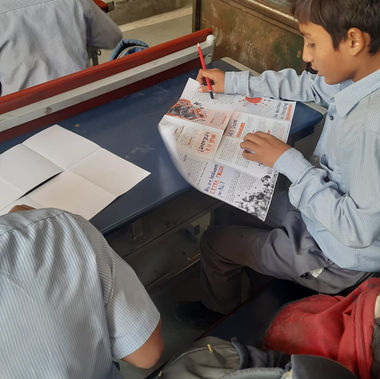Leveraging people centric narratives to educate young Indians about the climate crisis
Research, Learning Experience Design
TITLE:
Mausam Badal Raha Hai
MY ROLE:
Self Initiated Masters Thesis - MA Design for Social Innovation and Sustainable Futures (2023) at the University of Arts, London
COLLABORATORS:
Teach for India Fellows,
Students from Sarvodya Co-Ed Vidyalaya Masjid Moth, Delhi

Overview
‘Mausam Badal Raha Hai (The Weather is Changing)’,
explores the role of integrating people centric narratives of the climate crisis into India's public school curriculum. Building on the power of storytelling, the project uses zines to engage primary school students with ideas of climate justice and action through the lenses of people they encounter in their everyday lives.




Learning Objectives
Generating a sense of empathy through locally and contextually relevant stories of climate change
Introducing ideas of climate justice
Sparking curiosity by showcasing examples of climate action
Making connections between science based knowledge and local realities
Ali & The Heatwave
The zine tells the story of Ali, a platform delivery agent and discusses how his occupation makes him more vulnerable to Delhi’s heatwaves. It introduces concepts of climate justice and ends with a call to action asking students to think about how businesses and governments can help protect Ali.
Informed by a news article about heat stress on delivery agents and their lack of representation in India’s heat action plans, the zine is designed to act as a prototype for how complex climate issues can be simplified to educate a younger audience.






Background
This project took place over a period of 5 months and a large portion of the time was spent engaging in thorough secondary and primary research. Methods included dissecting the the primary school curriculum, curating Indian stories of climate change and interacting with primary school students.
To know about these in detail, view the project documentation here.

Key Findings
Education Policy takes
2 Steps Forward, 1 Step Back
The absence of Climate Change Education (CCE) in the Indian school curriculum was evident from discussions with Delhi educators and a study of the NCERT middle school syllabus. Even after the National Education Policy (NEP) 2020 recognised the importance of CCE, the NCERT eliminated chapters on climate change and monsoon to ease the workload on students, raising concerns about the priority of CCE in Indian School Curriculums.
The Climate Change discourse is mostly WEIRD*
Students' current knowledge of climate change is heavily science and fact based. While they are able to technically articulate the meanign of of global warming and carbon emissions; my research revealed a gap in linking these concepts to daily life. This doesn’t come as a surprise, as the NCERT curriculum limits students' engagement with the topic of climate change within the subjects of science and geography
There’s an Outdated sense of Deshbhakti (Patriotism)
In 2021 the Delhi Government introduced a Deshbhakti Curriculum with the intention of fostering an active citizenship mindset and instilling students with a sense of pride for India. The curriculum misses the opportunity to introduce students to climate action as a way of nation building in today's India, choosing to focus mainly on celebrating historical figures and encouraging feelings of nationalism.
*A study on decolonising climate change communication revealed that most strategies tend to cater to, “Western, Educated, Industrialised, Rich, and Democratic (WEIRD)" populations






Testing the Idea
I had the opportunity to test the zine with 38 seventh grade students (aged between 11-12). Their responses to the questions asked were synthesised into three categories:
A: Students who did the activity as a comprehension exercise, answering questions based on the information provided in the story.
B: Students who identified and answered questions from the point of view of delivery agents they knew personally.
C: Students who did the activity as intentioned, identifying other people who they thought were vulnerable to heat waves. These answers included family members, vegetable vendors, policemen/traffic policemen and urban municipality staff. Some of these answers have been showcased in the slideshow below.
To know more about how I evaluated the impact of the zines, read the project documentation here.
The illustrations and quotes have been taken from student responses to the zines, they have been visually edited for presentation.
Key Highlights
Zines as a Tool for Research
Zines proved to be a successful way to hook and engage students who where otherwise used to more straightforward methods of learning. Not only are they great for disseminating information through stories but they're also useful for encouraging participation in remote research settings.
Contextualising Climate Change
It's evident from research that students’ ability to visualise climate change in their surroundings is a crucial milestone in their journey to become change-makers in the future. In learning about climate change, the value of localising information is immense. Not only students, but everyone, can benefit from learning about the crisis in a way that is relevant to their context.








